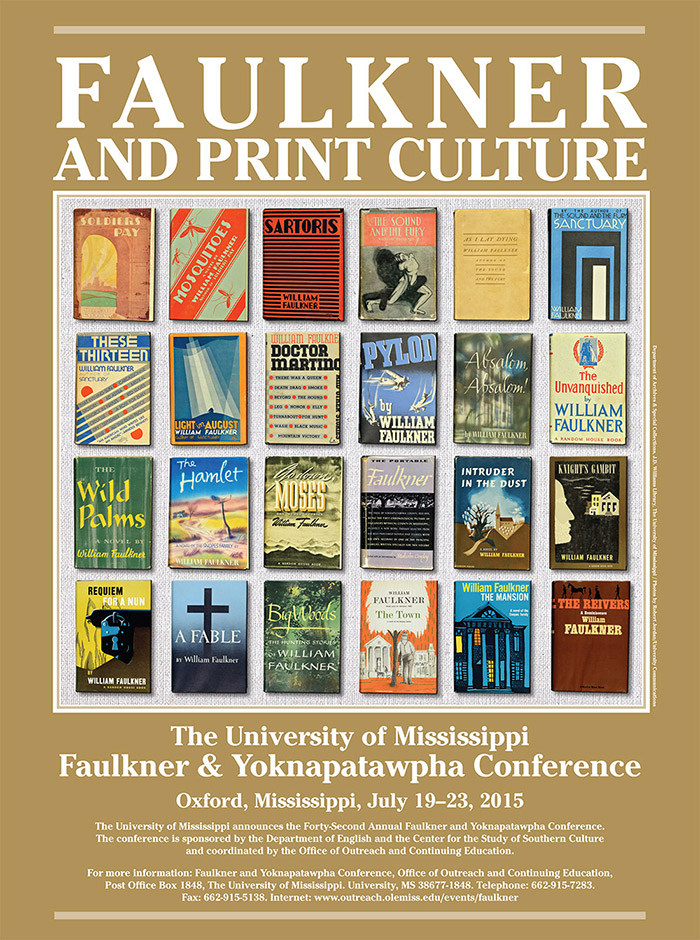
Panel. Faulkner and the Middlebrow
Location
Nutt Auditorium
Start Date
22-7-2015 3:30 PM
Description
- Wild Palms, The Mansion, and Faulkner's Middlebrow Domestic Fiction / Jaime Harker, University of Mississippi
William Faulkner’s middlebrow aspirations were largely centered on the Saturday Evening Post during the interwar period; unlike many modernist writers, notably F. Scott Fitzgerald, Faulkner did not tap into the lucrative print culture market of women’s magazines. It wasn’t until the Cold War era that he published some pieces in Harper’s Bazaar and Mademoiselle. But as a number of scholars have argued, notably Anne Goodwyn Jones, the conventions of women’s domestic fiction still inform Faulkner’s fiction. This paper analyzes women’s magazines’ culture of letters and places Wild Palms and The Mansion within a tradition of middlebrow domestic fiction. - Faulkner and The Saturday Review of Literature / Sarah E. Gardner
My paper examines The Saturday Review of Literature’s discussion of Sanctuary, which included a pre-review editorial, a formal review, letters to the editor, a follow-up 5,000-word essay by a Freudian psychoanalyst, and more letters to the editor. Although the magazine’s founder and editor, Henry Seidel Canby, considered Sanctuary vulgar and obscene, he nonetheless understood that it could not be dismissed. Assuming his middlebrow readers shared his tastes, he supplied scientific as well as literary commentary, thus positioning The Saturday Review as the indispensible guide that would give its readers a critical edge over those confused readers who could only, at best, reach ill-informed conclusions based on literary politics. - Middlebrow Patriotism, Neighborly Reading / Yung-Hsing Wu,
Seven years after receiving the 1949 Nobel Prize in Literature, the Faulkner who had been lauded for a “universal” regionalism became a Cold War Faulkner, tapped by President Dwight Eisenhower to head up the Writers Committee of the People to People program. Materials from the meetings suggest, however, that the writers’ primary identifications were vocational, concomitant with their faith in the literary expression of democracy. While this faith was a good fit for the program’s claim that the “exchange of information and ideas” and “neighborly association” would yield “friendship between peoples,” it also articulated the authors’ view that literature would not only advance a politics, but existed in advance of it.
Relational Format
Conference proceeding
Recommended Citation
Harker, Jaime L., "Panel. Faulkner and the Middlebrow" (2015). Faulkner and Yoknapatawpha Conference. 26.
https://egrove.olemiss.edu/fy/2015/schedule/26
COinS
Jul 22nd, 3:30 PM
Panel. Faulkner and the Middlebrow
Nutt Auditorium
- Wild Palms, The Mansion, and Faulkner's Middlebrow Domestic Fiction / Jaime Harker, University of Mississippi
William Faulkner’s middlebrow aspirations were largely centered on the Saturday Evening Post during the interwar period; unlike many modernist writers, notably F. Scott Fitzgerald, Faulkner did not tap into the lucrative print culture market of women’s magazines. It wasn’t until the Cold War era that he published some pieces in Harper’s Bazaar and Mademoiselle. But as a number of scholars have argued, notably Anne Goodwyn Jones, the conventions of women’s domestic fiction still inform Faulkner’s fiction. This paper analyzes women’s magazines’ culture of letters and places Wild Palms and The Mansion within a tradition of middlebrow domestic fiction. - Faulkner and The Saturday Review of Literature / Sarah E. Gardner
My paper examines The Saturday Review of Literature’s discussion of Sanctuary, which included a pre-review editorial, a formal review, letters to the editor, a follow-up 5,000-word essay by a Freudian psychoanalyst, and more letters to the editor. Although the magazine’s founder and editor, Henry Seidel Canby, considered Sanctuary vulgar and obscene, he nonetheless understood that it could not be dismissed. Assuming his middlebrow readers shared his tastes, he supplied scientific as well as literary commentary, thus positioning The Saturday Review as the indispensible guide that would give its readers a critical edge over those confused readers who could only, at best, reach ill-informed conclusions based on literary politics. - Middlebrow Patriotism, Neighborly Reading / Yung-Hsing Wu,
Seven years after receiving the 1949 Nobel Prize in Literature, the Faulkner who had been lauded for a “universal” regionalism became a Cold War Faulkner, tapped by President Dwight Eisenhower to head up the Writers Committee of the People to People program. Materials from the meetings suggest, however, that the writers’ primary identifications were vocational, concomitant with their faith in the literary expression of democracy. While this faith was a good fit for the program’s claim that the “exchange of information and ideas” and “neighborly association” would yield “friendship between peoples,” it also articulated the authors’ view that literature would not only advance a politics, but existed in advance of it.

